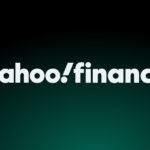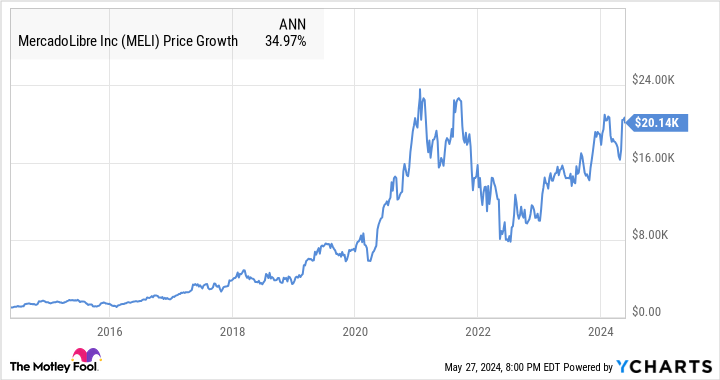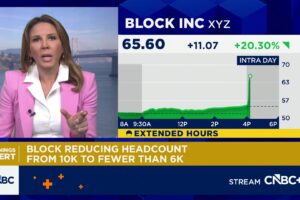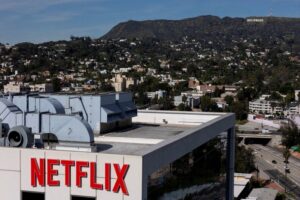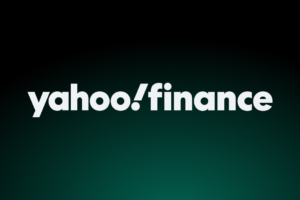Can it do it again? Let’s do the math.
How would you like to see a $1,000 investment gain almost 2,000% in 10 years? Investors dream about these kinds of returns. If you can identify stocks with incredible potential and diversify your holdings, you could very well end up owning a stock that delivers such gains.
MercadoLibre (MELI 0.85%) stock is one such example. If you’d invested $1,000 in MercadoLibre stock 10 years ago, you’d have just over $20,000 today. But we’re not here to talk about the past. Let’s see if this stock can reward investors the same way going forward.
It’s not easy to be a 20-bagger
MercadoLibre was relatively unknown 10 years ago, especially in the U.S., given its focus on Latin America. It required a leap of faith and came with plenty of risk, but there was a compelling bull case for the company as a younger Amazon with an e-commerce business in an untapped market.
Seeing that 20-bagger return also required you to hold the stock through significant volatility. Even now, the stock has yet to reclaim the all-time high it set in early 2021.
Data by YCharts.
MercadoLibre has continued to report outstanding growth over the past three years, but it fell along with many stocks in the recent bear market as a result of its rich valuation, decelerating sales growth, and dips in profitability. Shares have largely recovered, though, and they’re in an excellent position to keep climbing.
Unleashing opportunities in fintech
MercadoLibre is now an e-commerce and fintech juggernaut that dominates the Latin American market. It has reported double-digit revenue growth for years while increasing profitability at the same time.
Fintech is its major growth driver right now. Many Latin American consumers still lack access to financial and banking services. MercadoLibre provides easy-to-use digital alternatives such as electronic payments and credit products. Total payment volume increased 35% year over year, or 86% on a currency-neutral basis, in the first quarter, and the credit portfolio was up 46%.
To be clear, the company’s core e-commerce segment is still thriving as many Latin American countries are reporting some of the highest e-commerce growth rates globally. MercadoLibre’s gross merchandise volume increased 20% (71% currency neutral) last quarter, and it’s been accelerating from a post-pandemic slowdown. MercadoLibre continues to expand its logistics network, which is already quite efficient. For example, orders delivered within 48 hours increased 16% year over year in the first quarter and accounted for 52% of total orders. This is still a steady growth driver.
Like Amazon, the company gets the bulk of its revenue from the dependable e-commerce business, and it uses that to fund new, higher-growth ventures. It’s a compelling model that creates incredible opportunities.
Can it keep up these gains?
No one can tell the future, but is it realistic to expect MercadoLibre stock to return another 2,000% in the next 10 years? That’s the kind of performance typically attached to small hypergrowth companies.
Let’s look at how that could happen. MercadoLibre stock has a market cap of $86 billion. To grow 20-fold, it would become a $1.7 trillion company. There are only six companies today that have a market cap of more than $1 trillion, and incidentally, Amazon is one of them with a $1.9 trillion market cap.
Keeping MercadoLibre stock’s price-to-sales ratio constant at its current level of 5.5, the company’s trailing-12-month revenue of $15.8 billion would have to climb to about $313 billion to reach the desired $1.7 trillion market cap. Over 10 years, that implies a compound annual growth rate (CAGR) of 35%, almost exactly where its revenue growth came in last quarter. That 35% CAGR is also lower than the 44% average quarterly revenue growth MercaoLibre has enjoyed in the past 10 years.
But in the end, this is all theoretical. Growth rates could decelerate, the valuation could change, and myriad factors can impact a company and share price, especially over a decade-long stretch.
Whether or not it does happen, MercadoLibre is tackling incredible opportunities in its various markets and remains an excellent growth stock to add to your portfolio.
John Mackey, former CEO of Whole Foods Market, an Amazon subsidiary, is a member of The Motley Fool’s board of directors. Jennifer Saibil has positions in MercadoLibre. The Motley Fool has positions in and recommends Amazon and MercadoLibre. The Motley Fool has a disclosure policy.




